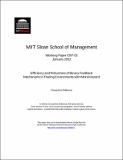Efficiency and Robustness of Binary Feedback Mechanisms in Trading Environments with Moral Hazard
Author(s)
Dellarocas, Chrysanthos
Download4297-03.pdf (425.4Kb)
Metadata
Show full item recordAbstract
This paper offers a systematic exploration of online feedback mechanism design issues
in trading environments with opportunistic sellers, imperfect monitoring of a seller's
effort level, and two possible transaction outcomes (corresponding to "high" and "low"
quality respectively), one of which has no value to buyers. The objective of feedback
mechanisms in such settings is to induce sellers to exert high effort and, therefore, to
maximize the probability of high quality outcomes. I study a practically significant family
of mechanisms that resembles aspects of the one used by online auction house eBay.
These feedback mechanisms solicit "binary" ratings of transaction outcomes as either
positive or negative and publish the sums of ratings posted by buyers on a seller during
the N most recent periods. My analysis finds that such "binary" feedback mechanisms
can induce high average levels of cooperation that remain stable over time.
Surprisingly, their efficiency cannot be improved by summarizing larger numbers of
ratings or by publishing a seller's detailed feedback history. I further examine the
robustness of these mechanisms to incorrect or incomplete feedback as well as to
strategic changes of online identities. The theoretical outcomes predicted by this paper
are consistent with empirical observations and offer theory-backed explanations to
hitherto poorly understood phenomena such as the remarkably low fraction of negative
feedback on eBa
Date issued
2003-04-14Series/Report no.
MIT Sloan School of Management Working Paper;4297-03
Keywords
Online Feedback Mechanisms, E-commerce, Moral Hazard, Game Theory, Electronic Markets, Internet